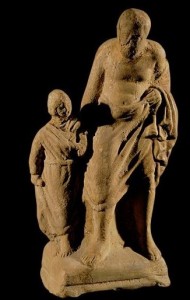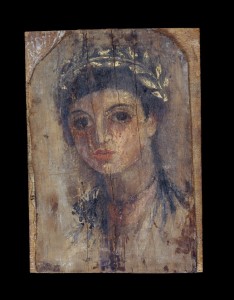The general public’s humanitas performed some sort of funeral rites for the corpse of one unknown to them. (From a practice legal speech, ps.-Quintilian, Major Declamations 6.3)
Humanitas forbids arrogance towards associates, and it forbids greed. In words, deeds and feelings, it shows itself gentle and courteous to all men. (Seneca the Younger, Letters 88.30)
In these premises of Aurelia Faustiniana is the bath, where you can bathe in the manner of the city, and here every civilized refinement (humanitas) is available. (Inscription from Ficulea, ILS 5720)
Those who fashioned the Latin vocabulary and have used it properly intended humanitas to mean not what most people think, which is expressed by the Greeks as philanthropia and signifies . . . a certain benevolence toward people in general; rather, they referred to as humanitas more or less what the Greeks call paideia, and which we call learning, and education in the good arts. (Aulus Gellius, Attic Nights 13.17)
No doubt the famous Scipio, a most learned and humane man, did not appreciate (Greek vases); but you, without any education, without humanitas, without talent, without knowledge of literature, no doubt you appreciate and judge them! (Cicero, Against Verres 2.4.98)
So exquisite was the humanitas of Crassus, that when they had bathed and sat down to dinner, all the bitterness of that earlier discussion had vanished. (Cicero, On the Orator 1.27)
As an ethical virtue, humanitas is a disposition toward compassion and sympathy for others. It was particularly admired in the powerful: generals, judges, provincial governors and emperors. “(Pompey) is a man of such humanitas that it is difficult to say whether the enemy fears his courage when fighting against him as much as they love his mercy after they have been conquered.” “Caesar, those who dare to speak before you are ignorant of your greatness; those who do not dare are ignorant of your humanitas.” The emperor Constantius was addressed not as, say, “your highness,” but “your humanitas.” If you were a conquered enemy, a provincial, or an imperial subject, you hoped for humanitas, but took what you got. In ordinary people, humanitas is the quality that makes one bury a dead stranger, take in a guest or traveler, give money to a beggar, cry in grief, reject a suitor without arrogance, or treat an animal well. We do small favors not for a man but for humanity, says Seneca (non homini sed humanitati), that is, on principle, not expecting any return. Kindness, above all, is what it means to be “human” in Latin.
As an aspect of luxury, humanitas was urban refinement and comfort, such as that advertised for the country baths of Aurelia Faustiniana, and which allowed one to rise above the beasts and enjoy life a bit. It was what Nero had in mind when, after the completion of his vast new palace complex which demolished whole neighborhoods in the center of Rome, he said that at last he could begin to live like a human being (quasi hominem).
The notions of human sympathy and cultured refinement are joined in a peculiar development of the language in the first century BC associated with Cicero and his contemporaries. Here humanitas connotes not, or not only, the Greek term philanthropia—a benevolent attitude toward people in general—but also the Greek paideia, liberal education. Education in the arts, Cicero believed, leads to both aesthetic refinement and to personal charm and ethical sensitivity. As a cultural attainment, humanitas involves a broad knowledge of history, law, philosophy, literature and the arts. It is the virtue that allows one to diffuse even the most awkward situations with interesting conversation, to adorn a persuasive speech with effective illustrations, to act courteously in the face of insult, to win over a difficult audience with personal ease and charm, to settle a question with an amusing and apposite remark, to write a beguiling letter, to quarrel in a manner considerate of others’ feelings.
The idea that broad education in literature, philosophy and the arts is the keystone to humanitas, to “living like a human being,” is closely associated with Cicero (especially his treatise on the ideal orator). For some reason this educational definition of humanitas is not picked up by later generations of Roman authors, and in subsequent centuries the word usually means simply “kindness.” Perhaps the notion that literary culture makes one humane seemed naïve given the sins of the highly literate Roman aristocracy. The emperor Tiberius, for example, had extremely refined literary tastes, but was also known for having people thrown off the cliffs near his seaside villa on Capri. As Seneca points out just after the passage quoted on humanitas, virtue has no necessary relationship to educational level.
At the center of the word is the hopeful idea that ethics and education and leadership might not be separate. When the emperor Valentinian fell ill in AD 367, the Gauls in attendance on him held a clandestine meeting and nominated as his successor the master of records Rusticus Julianus, a man, according to the contemporary historian Ammianus, whose bestial thirst for human blood verged on madness. Luckily the emperor revived, and the plan to install Rusticus (whose name aptly enough means “boor”) was thwarted. Ammianus then writes a speech which gives the virtue of humanitas a civic turn. Valentinian is commending his chosen successor, his young son Gratian, to the troops. “Because he has been educated from the beginning of his youth in humanitas and the studies of ingenious disciplines, he will weigh with impartial judgment the merits of deeds done rightly, or the opposite. He will act in such a way that good men will know that they are appreciated. . . . He will risk his life for the companions of his labors and, what is the first and highest form of loyalty, he will know how to love the Republic as he loves the house of his father and grandfather.” This Ciceronian dream of humanitas, in which literary and philosophical education makes us both better people and better citizens, was a powerful inspiration to Petrarch, Erasmus, and the other scholars whose devotion to classical learning shaped the European Renaissance. They have been given the name “humanists” in homage to it.
References:
TLL 6.3.3075-3083 collects the evidence. See RE Suppl. vol. 5.282-310. Greg Woolf, Becoming Roman: The Origins of Provincial Civilization in Gaul (Cambridge: Cambridge University Press, 1998) 54-60. Pompey’s humanitas: Cicero, On the Manlian Law 42. Those who dare to speak: remark by Q. Varius Geminus, the orator and friend of Augustus, quoted by Seneca the Elder, Controversiae 6.8. Constantius: TLL 6.3081, lines 66-67. Small favors: Seneca the Younger, On Benefits 4.29.3. Live like a human being: Suetonius, Nero 31.2. Valentinian and Gratian: Ammianus Marcellinus, The Later Roman Empire 27.6.]
Adapted from the book Ancient Rome in So Many Words (New York: Hippocrene, 2007) by Christopher Francese.


